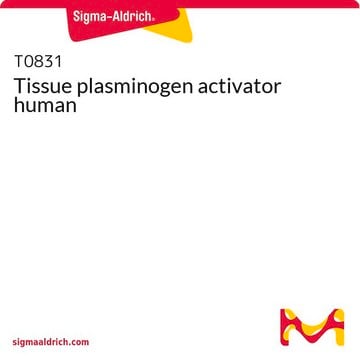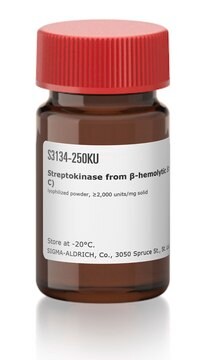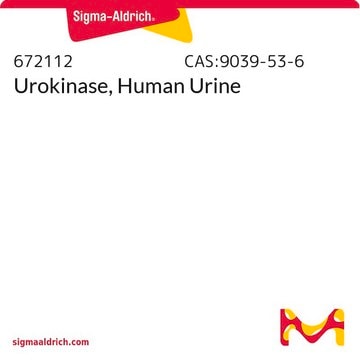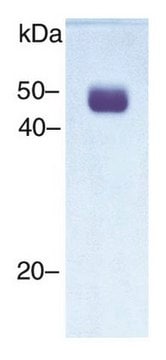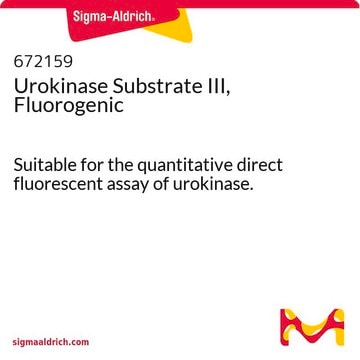U4010
Urokinase from human kidney cells
lyophilized powder
Synonym(s):
u-Plasminogen activator
Sign Into View Organizational & Contract Pricing
All Photos(1)
About This Item
Recommended Products
Quality Level
form
lyophilized powder
mol wt
heavy chain 30,400 Da
light chain 2000 Da
storage temp.
2-8°C
Looking for similar products? Visit Product Comparison Guide
Application
Urokinase from human kidney cells has been used as a component of digestion mix for three-dimensional fibrin culture. It has also been used in plasminogen activation assay.
Biochem/physiol Actions
Urokinase is a protease that cleaves plasminogen to form plasmin. It binds to cell surface receptors (uPAR) from which it regulates cell adhesion and migration during tissue remodeling and which also activate intracellular signaling pathways. Urokinase is composed of three domains: the amino terminal domain which is homologous to epidermal growth factor is attached through a central kringle domain to the protease domain in the carboxyl terminus.
Urokinase was shown to augment proliferation of renal tumor cells.
Physical properties
Supplied as a lyophilized powder containing human albumin, mannitol and NaCl.
The principle active ingredient is the low molecular weight form of urokinase, and consists of an A chain of 2,000 daltons linked by a sulfhydyl bond to a B chain of 30,400 daltons.
Other Notes
Note: Higher activities are obtained when human plasminogen is used as substrate.
Signal Word
Danger
Hazard Statements
Precautionary Statements
Hazard Classifications
Resp. Sens. 1
Storage Class Code
11 - Combustible Solids
WGK
WGK 3
Flash Point(F)
Not applicable
Flash Point(C)
Not applicable
Certificates of Analysis (COA)
Search for Certificates of Analysis (COA) by entering the products Lot/Batch Number. Lot and Batch Numbers can be found on a product’s label following the words ‘Lot’ or ‘Batch’.
Already Own This Product?
Find documentation for the products that you have recently purchased in the Document Library.
Customers Also Viewed
Hematopoietic-to-mesenchymal transition of adipose tissue macrophages is regulated by integrin beta and fabricated fibrin matrices
Gavin KM, et al.
Adipocyte, 6(3), 234-249 (2017)
J C Kirchheimer et al.
Carcinogenesis, 9(11), 2121-2123 (1988-11-01)
Primary cultures of renal cell carcinomas and of the corresponding normal adjacent kidney tissue from 6 patients were analyzed for the effects of exogenously added urokinase-type plasminogen activator on cell proliferation as compared to the effects of tissue type plasminogen
Benjamin J Buckley et al.
International journal of molecular sciences, 22(6) (2021-04-04)
The K+-sparing diuretic amiloride shows off-target anti-cancer effects in multiple rodent models. These effects arise from the inhibition of two distinct cancer targets: the trypsin-like serine protease urokinase-type plasminogen activator (uPA), a cell-surface mediator of matrix degradation and tumor cell
Nava Chapnik et al.
The Journal of endocrinology, 217(3), 283-290 (2013-03-14)
Transgenic alpha murine urokinase-type plasminogen activator (αMUPA) mice are resistant to obesity and their locomotor activity is altered. As these mice have high leptin levels, our objective was to test whether leptin is responsible for these characteristics. αMUPA, their genetic
Andrew J Fleetwood et al.
Journal of immunology (Baltimore, Md. : 1950), 192(8), 3540-3547 (2014-03-13)
Urokinase plasminogen activator (uPA) and its receptor (uPAR) coordinate a plasmin-mediated proteolytic cascade that has been implicated in cell adhesion, cell motility, and matrix breakdown, for example, during inflammation. As part of their function during inflammatory responses, macrophages move through
Our team of scientists has experience in all areas of research including Life Science, Material Science, Chemical Synthesis, Chromatography, Analytical and many others.
Contact Technical Service